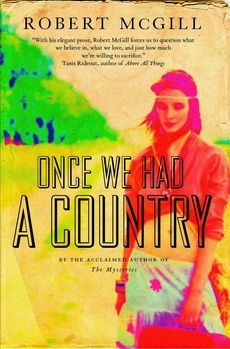Once We Had a Country: Deleted Scene #1 — Pillow Talk
In Once We Had a Country, the main character, Maggie, spends a lot of time filming her life with a Super 8 camera. As I wrote the novel, sometimes I thought of myself as similarly creating a film rather than a book. I was the director, cinematographer, set designer, dialect coach, lighting engineer, foley artist, and caterer by turns.
The hardest role might have been editing—especially when it came to cutting scenes. Nowadays, filmmakers faced with the need to trim their movies can at least include a “Deleted Scenes” feature on the DVD version of their films. I’m going to follow their lead by featuring some deleted scenes from Once We Had a Country on this site.
The first, brief scene is below. It features Maggie and Fletcher, her boyfriend of six months, talking in bed after having taken up residence at a cherry farm in 1972. The scene was one of my favourites in early drafts. But it came at a point where the story needed more momentum, so I had to leave it on the cutting-room floor.
The two of them are lying in bed with their clothes on, hiding from the afternoon, and Fletcher’s talking about his ex-girlfriend Cybil. Not just his ex-girlfriend, but his ex-fiancée. Maggie knows this fact of history well enough, although she doesn’t like to think about it. He’s saying it was stupid for two people so young to be planning marriage, and he assures her that the engagement was solely the result of family pressure.
“Baby, you should have seen her, the way she tried to please her folks. With them around, she was nothing but sweetness and light, and then when we were alone it was all gnashing of teeth.” He rolls onto his front. “Sorry, you’ve heard this before—”
“I don’t mind hearing it again.”
“Well, she was crazy. If you invited her to dinner, she needed to ask Daddy first. She had her own car. She had an apartment! Why ask her father?”
“But she was a good person. She works for all those charities—”
“Sure, I guess. That’s expected of girls like her.”
“What was she like in bed?” Maggie’s heard about this before, too.
“Limp spaghetti,” he replies. “You’d get more life from a rubber doll.” He reaches over and tickles her armpit, as if to prove that she, at least, is not made of rubber or pasta.
“She was beautiful,” Maggie insists. He makes a face to suggest grudging acceptance of this claim. “And your parents liked her. They liked her more than me.”
“They liked her money,” he amends. “Forget my parents. You and I have to stick together.” He turns pensive for a moment. “And you know what? She had the gall to blame me for her problems. You should have heard her. She said I was insensitive, smug, aloof . . . Aloof! When I was the one sitting there with her, putting up with that stuff.”
“You grew, though. You learned what people can be like.”
“I guess so. But it took a toll.” His voice begins to waver. “It used up my goodness.”
“That’s not true.”
“Yes it is. I used to be more . . . giving.” He trails off into his own thoughts. “I guess it taught me something about weddings, at least. All that planning’s a scam to distract you from the fact that you’re signing your life away.” Maggie nods slowly, not quite sure she’s in agreement.
“Or maybe,” she says, “it’s to browbeat you from the start, so you get used to doing what everyone else wants.”
“Yeah,” he says, “and the amazing thing is, they jive you into thinking it’s what you want, what you’ve always wanted.”
This is the only way in which the two of them ever talk about getting married.
